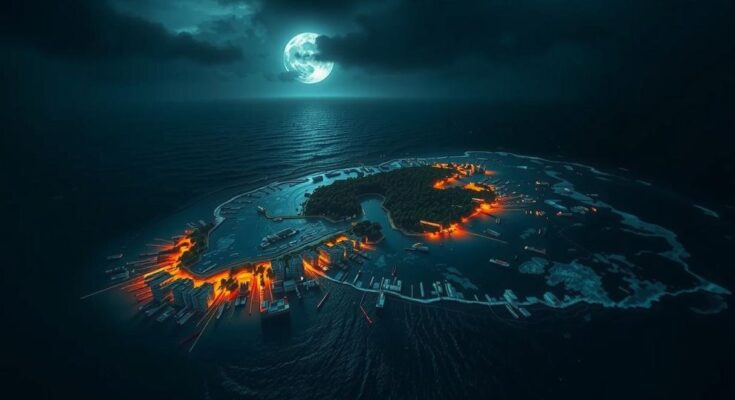Hurricane Rafael has left the entire island of Cuba without power for the second time in two weeks, causing significant damage to crops and infrastructure. Residents face skepticism regarding the government’s ability to provide essential services amidst economic challenges. The National Hurricane Center confirmed reduced intensity post-storm. Efforts are underway to facilitate recovery, yet frustrations linger among citizens due to ongoing vulnerabilities and economic constraints.
Cuba is grappling with a significant crisis as Hurricane Rafael has resulted in a complete power outage across the entire island for the second time in two weeks. This major weather event caused destructive winds that devastated crops and downed trees and power lines, particularly affecting western agricultural regions. After the hurricane made landfall, the National Hurricane Center reported a decrease in Rafael’s intensity as it progressed into the Gulf of Mexico. Meanwhile, citizens emerged to survey damage in Havana, where many businesses remained closed, and transport operations were gradually being restored. In response to the disaster, Cuban President Miguel Diaz-Canel has mobilized military resources to assist in recovery efforts. He expressed the government’s commitment to safeguarding its citizens and managing material resources, pledging that the nation would overcome this adversity. However, there is a prevailing sentiment of frustration and skepticism among Cubans toward the government’s ability to deliver essential services due to ongoing economic challenges.
The impact of Hurricane Rafael is part of a series of devastating weather events affecting Cuba, including a previous hurricane that led to power outages linked to the age and inefficiency of the country’s thermoelectric power stations. The ongoing hurricane season has already seen a notably high number of tropical storms, exerting significant strain on the island’s outdated infrastructure. Given Cuba’s limited financial resources and dependency on external support, such as from Venezuela, the implications of these hurricanes are further complicated by socio-economic vulnerabilities. In addition to environmental concerns, the deteriorating relations with the United States have hindered Cuba’s access to vital resources and aid. As a consequence, the island’s population must deal with the repercussions of economic restrictions and natural disasters, often without immediate governmental support.
The scenario unfolding in Cuba following Hurricane Rafael reveals deep-seated vulnerabilities within the island’s infrastructure and economy. With power restored slowly after an extensive outage, citizens confront the dilemma of inadequate disaster response mechanisms attributed to an economy strained by external pressures. Continued hurricane activity raises significant concerns regarding future disaster preparedness and recovery capacity, underscoring the necessity for improved infrastructure and resource management to safeguard the Cuban population against similar events in the future.
Original Source: www.aljazeera.com




